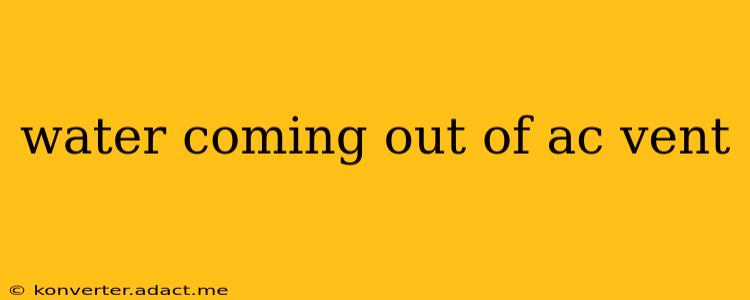Finding water leaking from your air conditioning vent is alarming, but it's a problem with a few common causes and solutions. This comprehensive guide will walk you through identifying the source of the leak and fixing it, saving you potential damage and costly repairs.
Why is Water Coming Out of My AC Vent?
The most common reason for water leaking from your AC vent is a clogged condensate drain line. Your air conditioner produces condensation as it cools the air. This condensate typically drains away through a small pipe, but if this pipe becomes blocked, the water backs up and overflows, eventually finding its way out through the vents.
How to Fix Water Leaking from AC Vent?
Before you start, remember safety first! Turn off the air conditioner's power supply at the breaker box before attempting any repairs.
1. Check the Condensate Drain Line
This is usually the culprit. Locate the condensate drain line (often a small PVC pipe) connected to your air conditioning unit. Inspect it for blockages. You might find:
- Algae buildup: This is a common problem in humid climates. A simple cleaning might suffice.
- Debris: Leaves, dust, or other debris can obstruct the flow.
- Kinks or breaks: A damaged drain line needs repair or replacement.
How to clear a clogged drain line:
- Use a wet/dry vacuum: Carefully suction out any visible debris.
- Flush with water: Use a garden hose or a wet/dry vacuum with a blower function to flush the line clear.
- Chemical drain cleaner (use cautiously): As a last resort, a drain cleaner specifically designed for PVC pipes can be used. Follow the manufacturer's instructions carefully.
2. Inspect the Condensate Pan
The condensate pan is the container that collects the condensation before it drains away. If the pan is cracked, damaged, or overflowing, it can lead to water leaking from your AC vents. Inspect the pan for cracks, holes, or excessive rust. If the pan is damaged, it will need to be replaced.
3. Examine the Air Conditioner's Evaporator Coil
The evaporator coil is where the cooling process takes place. If the coil is frozen, it can restrict the flow of condensate, causing water to back up and leak from the vents. A frozen coil often points to a more serious problem, such as a restricted airflow or refrigerant leak. In this case, you'll need professional help.
4. Check for a Refrigerant Leak
A refrigerant leak can cause the evaporator coil to freeze, leading to water leaking from the vents. This is a serious problem that requires the attention of an HVAC technician. A leaking refrigerant also reduces the cooling capacity of your system.
5. Condensation on the Outside of the Air Conditioner
While water inside the system leaking into vents is common, sometimes water on the outside of the unit can drip and seem like it's coming from vents. Check your external unit for proper drainage; make sure the area around it isn't obstructed.
Is it a DIY Fix or Should I Call a Professional?
Simple clogs in the drain line can often be cleared with DIY methods. However, if you suspect a more significant issue like a refrigerant leak, a frozen evaporator coil, or a damaged condensate pan, it's best to contact a qualified HVAC technician. Attempting complex repairs yourself could worsen the problem and potentially damage your air conditioning system.
How Often Should I Clean My AC Drain Line?
As a preventative measure, consider cleaning your AC drain line at least once a year, or more frequently if you live in a humid climate. This simple maintenance can prevent future water leaks and extend the life of your air conditioning system.
What causes a frozen evaporator coil? (PAA)
A frozen evaporator coil is often caused by restricted airflow (dirty air filter, blocked vents, etc.), low refrigerant, or a malfunctioning blower motor. These all reduce the system's ability to effectively dehumidify the air, resulting in ice formation.
How do I clean my air conditioner drain line? (PAA)
You can clean your AC drain line using a wet/dry vacuum to remove debris, flushing it with water, or (as a last resort) a drain cleaner specifically formulated for PVC pipes. Always refer to the manufacturer's instructions for any chemicals used.
What to do if water is leaking from AC vents? (PAA)
First, turn off the system at the breaker box. Then, check the condensate drain line for clogs, inspect the condensate pan for damage, and examine the evaporator coil for freezing. If you find a simple clog, you can usually clear it yourself. More serious issues require a professional HVAC technician.
Why is my AC dripping water inside? (PAA)
This usually indicates a problem with the condensate drain line. A clogged drain prevents proper drainage of condensation, causing it to overflow and leak inside the system, often appearing at the vents.
Remember, while this guide provides helpful information, it's not a substitute for professional advice. If you're uncomfortable tackling any repairs yourself, contact a qualified HVAC technician to diagnose and fix the problem. This will help ensure your system's longevity and safety.
